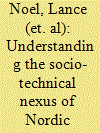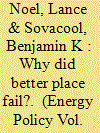|
|
|
Sort Order |
|
|
|
Items / Page
|
|
|
|
|
|
|
| Srl | Item |
| 1 |
ID:
171472


|
|
|
|
|
| Summary/Abstract |
Electric vehicles are perceived as a key alternate to internal combustion engine vehicles for a transition to a decarbonized society. However, this transition towards the electrification of transport has not made equal progress globally, and faced several impediments to consumer adoption of EVs across the Nordic region and beyond. While there has been a multitude of reasons provided in the literature, we aim to characterize the barriers that remain to electrification today, as well as their perceived interconnections and futures. To provide insight into this query, the authors conducted 227 semi-structured interviews with transportation and electricity experts from 201 institutions across seventeen cities in Denmark, Finland, Iceland, Norway, and Sweden. The qualitative results and consequent cluster analysis show that common barriers like range, price and charging infrastructure continue to persist, despite technological advancements over the recent years. At the same time, results also show that barriers are highly interconnected and are commonly connected to consumer knowledge and experience. The article concludes with a discussion of policy implications of the findings and potential future research.
|
|
|
|
|
|
|
|
|
|
|
|
|
|
|
|
| 2 |
ID:
150664


|
|
|
|
|
| Summary/Abstract |
With almost $1 billion in funding, Better Place was poised to become one of the most innovative companies in the electric mobility market. The system Better Place proposed had two novel prongs; first, to reduce the cost of batteries, and second, to reduce range anxiety, public infrastructure concerns, and long charging times. Yet, despite this seemingly strong combination, Better Place failed to make any progress in Denmark and Israel, the first two markets it operated in, and subsequently declared bankruptcy, selling off its collective assets for less than $500,000. Drawing from science and technology studies and the notion of “interpretive flexibility,” this paper posits several reasons to explain the failure of Better Place, including that Denmark is not as “green” as it seems nor is the Israeli market as attractive as believed, and that Better Place's solution to charging time and range anxiety resolved a psychological, not a functional, barrier of the general public to adopt electric vehicles. Before investigating these two reasons, the paper presents a short history of Better Place and explores the contours of its operations in Denmark and Israel. It then discusses why Better Place “failed” across both countries before concluding with implications for energy planning, policy, and analysis.
|
|
|
|
|
|
|
|
|
|
|
|
|
|
|
|
|
|
|
|
|